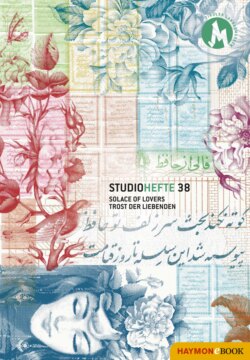Читать книгу Solace of Lovers. Trost der Liebenden - Helena Perena - Страница 10
TEHRAN
ОглавлениеShariati St. (opposite side of Arab Hosseini Blvd.), Molla Sadra St., Sharmad Dead End no. 11, fourth floor. When I wake up, I look through a large three-piece window topped by two rounded glass panes above into Tehran’s deep blue autumn sky. A crow croaks. From a distance the occasional sound of passing vehicles. A quiet quarter that falls almost silent in the evening, interrupted at times only by voices, slamming doors, sporadic noises and scraps of conversation from neighbouring buildings. On the windowsill a row of succulents and cacti, more potted plants on a wooden flower stand like a stool with long legs, a small palm tree beside the desk. On the wall hang Persian instruments, two baglamas, two Tanburs, a Kamancheh from Lorestan and a Setar. Amir’s music room, a small, intimate, light-filled room leading to a small south-facing balcony. From the fourth floor I have a good view of the quarter’s narrow alleys. When I stepped into the living room today my hosts had already gone to work, leaving the water for tea in the samovar simmering over the full flame of the gas stove. Basically very little has changed here. The scrap iron collector is still doing his rounds; the tinny sound of his constantly repeated calls reaches me from the loudspeaker mounted on the roof of his pickup. A dhikr, a prayer ritual of everyday life, which is part of the familiar soundscape of Persian cities, just like the smells of spices, wood, Sangak bread and uncertain origins, which all at once evoke so many memories in me. Sounds, scents, colours and long forgotten words in Farsi are raised from the depths of my forgetfulness so that I come to understand their meaning once more. Old faces, voices, stories of a hybrid dreamland, into which I can immerse myself again with a quite unexpected feeling of happiness, which everywhere else have long since faded beyond rescue.
“Just like the wind in this world – it blows and lifts the edge of the carpet,
and the rugs become restless and move. It whisks up waste and straws,
gives the surface of the pool the look of a coat of mail,
brings dance to trees, twigs and leaves, and extinguishes the lamps;
it brings a flare to the half-burned wood and a stir to the fire.
All these states seem diverse and different,
but from the standpoint of the object and the root and reality
they are but one as their movement comes from the wind.”
Molavi (1207–1273)
In the Tajrish Metro Station, the three extra-long, steeply rising escalators trigger a dizzying, surreal feeling of ascending into heaven: crowds of people floating upwards, all seemingly stiff as a poker. It reminds me of a scene in a science fiction film, the title of which escapes me. In the film, every human being is only allowed a certain amount of time to live, and when that time expires, an implanted crystal worn on the palm of the hand turns cloudy and dark. Then in a special, almost sacred ceremony, the candidates for death are “elevated” in a kind of coliseum; released from gravity, they float upwards into a cupola where – as if torched by a high voltage current – they are pulverised and fall away in a veritable shower of sparks.
Bombaste/Dead End, Tehran, 2019 / Bombaste/Dead End, Teheran, 2019
